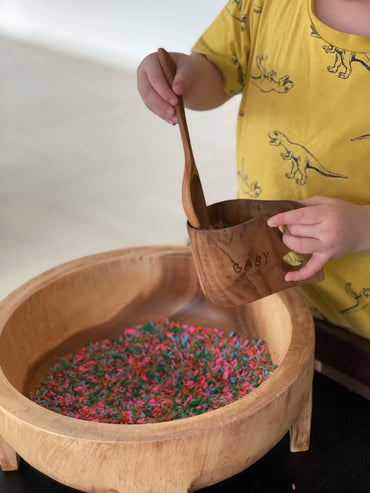Why do you need Echo Dot?
THE MAKING OF A RICE SENSORY BIN
-
Rice Colouring
Coloring rice is something that can be done by parents with your little ones (2 to 6 years old) at home. You probably already have all of the supplies in the kitchen. If you’re new to rice colouring, all you need are some food colouring, plastic zip lock bags, uncooked rice and vinegar. -
Scoop, Add & Seal
Get your child involve by asking them to scoop the uncooked rice in each plastic zip lock bags, add a few droplets of food colouring and vinegar in. A spoonful of vinegar can help the rice and colour last longer. Seal the bags, let your child hold and use their fingers to mix the colour. Last but not least, spread out the coloured rice on a tray to dry. -
Wabi-Sabi Play Tools
Prepare Children Activity Bowl with Stands, Baby Wine Mugs and Wooden Spoons from the Wabi-Sabi Play Collection. -
Mini Safari
Collect any animal and jungle toys set from home and get ready to create a Mini Safari with your child. -
Build & Play!
Pour the colourful dried rice into the Baby Wine Mugs. Then, let your child create their own imaginative Mini Safari. Ask questions like "What is the tallest animal in the world?" during play to interact and educate.


Time to Play!
Scoop and pour, over and over again! This is what toddlers love to do! They love the way it feels and they cannot resist poking their fingers into the rice too.

Their Little World
Set a scene together with all the animal figurines. In this activity, your child will probably like to swap all of the animal figurines in and out, talk about where they would place the animals in the sensory bin.

Activity Benefits Early Development
There are a lot of learning opportunities with this activity, from talking about the animals to their habitats, what they eat, where they live and how they move. Your child is learning through play!
BENEFITS
The 4 Focused Developments of "Mini Safari" Rice Sensory Bin Activity

Physical Development
Improve in fine motor skills. Sensory bins can increase hand strength as children mix, scoop, dig and pour the rice while using different tools such as a spoon. It helps to develop grasp patterns needed for handwriting, managing feeding utensils and practicing eye-hand coordination.

Social & Emotional Development
Increase Socialization with People Around. Sensory play provides opportunities for children to communicate, express feelings, take turns, cooperate with others, including siblings and parents.

Language Development
Promote language skills. Children would also learn new words or even make different sound effects such as mimicking the sound of animals as they play.

Cognitive Development
Gain Knowledge in early Science and Mathematics. Sensory bins can support cognitive development as children learn the name of each animal, gain practice with counting the animals and identify the characteristics of animals.

